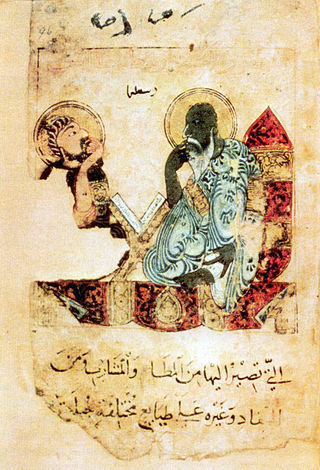Related Research Articles

Islamic philosophy is philosophy that emerges from the Islamic tradition. Two terms traditionally used in the Islamic world are sometimes translated as philosophy—falsafa, which refers to philosophy as well as logic, mathematics, and physics; and Kalam, which refers to a rationalist form of Scholastic Islamic theology which includes the schools of Maturidiyah, Ashaira and Mu'tazila.

Abu Nasr Muhammad al-Farabi., born either in Faryab in Khorasan or Farab in Transoxania, c. 870— died in Damascus between 14 December 950 and 12 January 951), known in the Latin West as Alpharabius. He was an impeccable early Islamic philosopher and music theorist, and has been designated the Father of Islamic Neoplatonism, and Founder of Islamic Political Philosophy.

Seyyed Hossein Nasr is an Iranian philosopher, theologian and Islamic scholar. He is University Professor of Islamic studies at George Washington University.

"Shihāb ad-Dīn" Yahya ibn Habash Suhrawardī (1154–1191) was a Persian philosopher and founder of the Iranian school of Illuminationism, an important school in Islamic philosophy. The "light" in his "Philosophy of Illumination" is the source of knowledge. He is referred to by the honorific title Shaikh al-ʿIshraq "Master of Illumination" and Shaikh al-Maqtul "the Murdered Master", in reference to his execution for heresy. Mulla Sadra, the Persian sage of the Safavid era described Suhrawardi as the "Reviver of the Traces of the Pahlavi (Iranian) Sages", and Suhrawardi, in his magnum opus "The Philosophy of Illumination", thought of himself as a reviver or resuscitator of the ancient tradition of Persian wisdom.

Abū Muḥammad ʿAlī ibn Aḥmad ibn Saʿīd ibn Ḥazm was an Arab Andalusian Muslim polymath, historian, muhaddith, jurist, philosopher, and theologian, born in the Caliphate of Córdoba, present-day Spain. Described as one of the strictest hadith interpreters, Ibn Hazm was a leading proponent and codifier of the Zahiri school of Islamic thought and produced a reported 400 works, of which only 40 still survive. In all, his written works amounted to some 80 000 pages. Described as one of the fathers of comparative religion, the Encyclopaedia of Islam refers to him as having been one of the leading thinkers of the Muslim world.
Shams al-Din Muhammad ibn Mahmud Shahrazuri was a 13th-century Muslim physician, historian and philosopher. He was of Kurdish origin. It appears that he was alive in AD 1288. However, it is also said that he died in the same year.
Contemporary Islamic philosophy revives some of the trends of medieval Islamic philosophy, notably the tension between Mutazilite and Asharite views of ethics in science and law, and the duty of Muslims and role of Islam in the sociology of knowledge and in forming ethical codes and legal codes, especially the fiqh and rules of jihad. See list of Islamic terms in Arabic for a glossary of key terms used in Islam.
Iranian philosophy or Persian philosophy can be traced back as far as to Old Iranian philosophical traditions and thoughts which originated in ancient Indo-Iranian roots and were considerably influenced by Zarathustra's teachings. According to the Oxford Dictionary of Philosophy, the chronology of the subject and science of philosophy starts with the Indo-Iranians, dating this event to 1500 BC. The Oxford dictionary also states, "Zarathustra's philosophy entered to influence Western tradition through Judaism, and therefore on Middle Platonism."

William Clark Chittick is an American philosopher, writer, translator and interpreter of classical Islamic philosophical and mystical texts. He is best known for his work on Rumi and Ibn 'Arabi, and has written extensively on the school of Ibn 'Arabi, Islamic philosophy, and Islamic cosmology. He is a Distinguished Professor in the Department of Asian and Asian American Studies at Stony Brook University.
Abu 'Abd Allah Muhammad b. 'Abd Allah b. Masarra b. Najih al-Jabali (883–931), was an Andalusian Muslim ascetic and scholar. He is considered one of the first Sufis as well as one of the first philosophers of Al-Andalus.
Avicennism is a school of Islamic philosophy which was established by Avicenna. He developed his philosophy throughout the course of his life after being deeply moved and concerned by the Metaphysics of Aristotle and studying it for over a year. According to Henry Corbin and Seyyed Hossein Nasr, there are two kinds of Avicennism: Islamic Avicennism, and Latin Avicennism. According to Nasr, the Latin Avicennism was based on the former philosophical works of Avicenna. This school followed the Peripatetic school of philosophy and tried to describe the structure of reality with a rational system of thinking. In the twelfth century AD, it became influential in Europe, particularly in Oxford and Paris, and affected some notable philosophers such as Thomas Aquinas, Roger Bacon and Duns Scotus. While the Latin Avicennism was weak in comparison with Latin Averroism, according to Étienne Gilson there was an "Avicennising Augustinism". On the other hand, Islamic Avicennism is based on his later works which is known as "The Oriental Philosophy". Therefore, philosophy in the Eastern Islamic civilization became close to gnosis and tried to provide a vision of a spiritual universe. This approach paved the road for the Iranian school of Illuminationism by Suhrawardi.

Joseph E.B. Lumbard is an American Muslim scholar of Islamic studies and associate professor of Quranic studies at the College of Islamic Studies at Hamad Bin Khalifa University in Qatar. He is the author, editor, and translator of several scholarly books and many articles on Islamic philosophy, Sufism, and Quranic studies.
Mul·lā "al-Muḥsin" "al-Fayḍ" al-Kāshānī was an Iranian Twelver Shi'i Muslim, mystic, poet, philosopher, and muhaddith.
Hossein Ziai was a professor of Islamic Philosophy and Iranian Studies at UCLA where he held the inaugural Jahangir and Eleanor Amuzegar Chair in Iranian Studies until his passing. He received his B.S. in Intensive Physics and Mathematics from Yale University in 1967 and a Ph.D. in Islamic Philosophy from Harvard University in 1976. Prior to UCLA, Ziai taught at Tehran University, Sharif University, Harvard University, Brown University, and Oberlin College. As Director of Iranian Studies at UCLA, where he taught since 1988, Ziai established an undergraduate major in Iranian in the Department of Near Eastern Languages and Cultures—the first such degree in North America—and developed the strongest and most rigorous Iranian Studies program in the U.S.
Illuminationism, also known as Ishrāqiyyun or simply Ishrāqi is a philosophical and mystical school of thought introduced by Shahab al-Din Suhrawardi in the twelfth century, established with his Kitab Hikmat al-Ishraq, a fundamental text finished in 1186. Written with influence from Avicennism, Peripateticism, and Neoplatonism, the philosophy is nevertheless distinct as a novel and holistic addition to the history of Islamic philosophy.
Najm al-Dīn 'Alī ibn 'Umar al-Qazwīnī al-Kātibī was a Persian Islamic philosopher and logician of the Shafi`i school. A student of Athīr al-Dīn al-Abharī. His most important works are a treatise on logic, Al-Risala al-Shamsiyya, and one on metaphysics and the natural sciences, Hikmat al-'Ain.

Zailan Moris is a Malaysian scholar of Islamic philosophy and former professor of the School of Humanities at the University Sains Malaysia. Her main interests are Islamic philosophy, comparative religion and Sufism.
Caner Dagli is a Circassian-American Islamic scholar and associate professor of Religious Studies at the College of the Holy Cross in Worcester, Massachusetts.

Islamic Philosophy from its Origin to the Present: Philosophy in the Land of Prophecy is a book by Seyyed Hossein Nasr, Iranian philosopher and University Professor of Islamic studies at George Washington University, including a comprehensive overview of Islamic philosophy from the 9th century to the present day.
References
- ↑ Seyyed Hossein Nasr and Oliver Leaman, ed. (2001). History of Islamic Philosophy. History of World Philosophies. Routledge.
- ↑ Burnett, Chris (1997). "The Near and Middle East - Seyyed Hossein Nasr and Oliver Leaman (ed.): History of Islamic philosophy. (Routledge History of World Philosophies, Vol. 1, Parts 1 and 2.) xx, 780 pp.; xiv, 783–1211 pp. London and New York: Routledge, 1996. £120". Bulletin of the School of Oriental and African Studies. 60 (3): 552–553. doi:10.1017/S0041977X00032675.
- ↑ McGinnis, Jon (2002). "History of Islamic Philosophy". The Journal of the American Oriental Society. 122 (4): 855 ff.